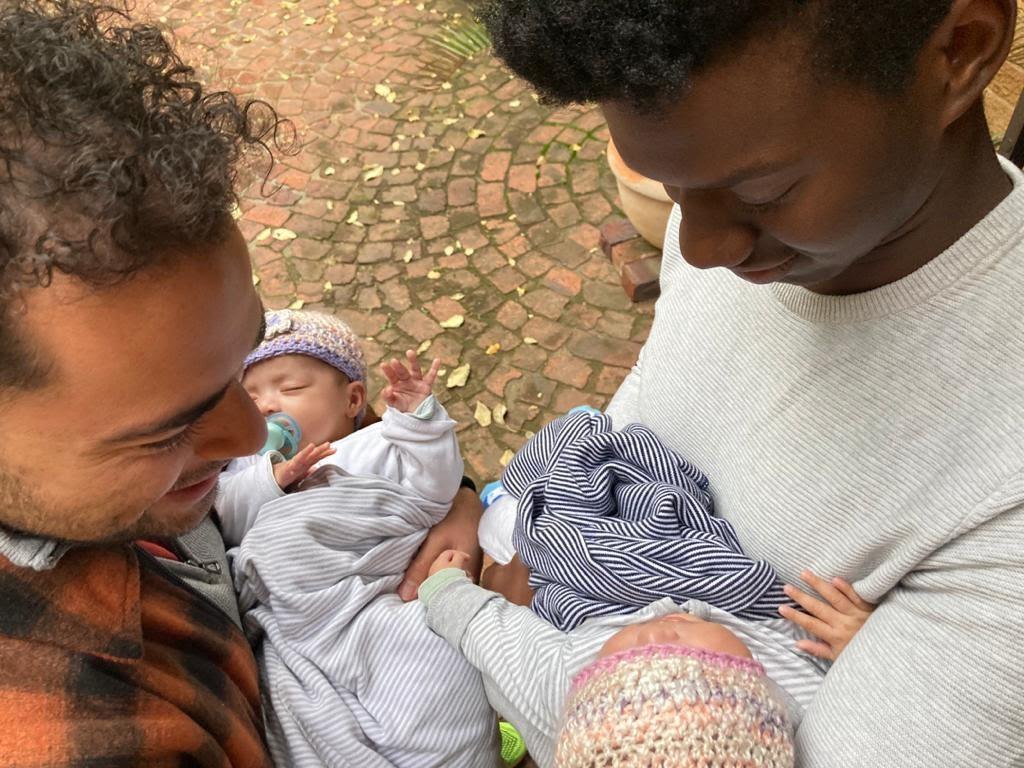Home affairs urges Mexican citizenship for Delgado-Lühl twins
Mexican authorities have notified the family that the application for nationality is a lengthy process, and urged the ministry to prioritise the best interests of the children.
JANA-MARI SMITH
WINDHOEK
The home affairs ministry has issued a brown passport to Yona, the two-year-old son of Phillip Lühl and Guillermo Delgado, to allow him to travel to South Africa to apply for Mexican citizenship.
Brown passports are essentially an emergency travel document that have, in the past, also been issued to stateless refugees in Namibia.
The family has now asked the ministry to consider issuing the same passports to twins Paula and Maya, who remain marooned in South Africa 60 days after their birth.
Although the family officially applied for Namibian emergency travel documents three weeks ago, shortly after a devastating court ruling dismissing their application to allow them to bring the babies home, the ministry has not yet provided a final answer on that application, despite the family’s lawyers requesting that the ministry respond by close of business yesterday.
The ministry has, instead, suggested that the twins and their brother apply for Mexican citizenship.
Side-stepping
In a letter to the family last week, ministry executive director Etienne Maritz said the brown passport issued to Yona was so he could travel to South Africa to be “registered as a Mexican national”.
Maritz said the passport is valid for 12 months, and added that if the twins also applied and were granted Mexican citizenship, they would “be able to travel to Namibia on visitor entry permits and we will permit them to remain in Namibia beyond the expiration days given to them pending the finalisation of the case in the High Court”.
In response, lawyer Unomuinjo Katjipuka-Sibolile warned that this was not a solution to the current crisis facing the family.
She said the Mexican authorities had notified the family that the application for nationality is a lengthy process, and urged the ministry to prioritise the best interests of the children.
“We urge you to keep in mind that it has been nearly two months that the twins have been stranded in South Africa, separated from the rest of their family. We reiterate that with each day that passes, the situation for the family becomes more and more desperate and more and more urgent.”
Katjipuka-Sibolile emphasised that obtaining Mexican documents should not be misconstrued as a “relinquishment of their claim to Namibian citizenship”.
In limbo
Like his sisters, Yona’s legal parents are identified as Lühl and Delgado in an official South African birth certificate and High Court order, but Namibian authorities have, as with his sisters, refused to accept the birth certificates, insisting on a DNA test to prove his biological link to his Namibian father, Lühl.
His battle to be granted citizenship will end on 4 August, when High Court judge Thomas Masuku hands down his ruling in that case. Masuku also helmed two other cases brought to court by the family, and ruled against their applications in both cases.
[email protected]
WINDHOEK
The home affairs ministry has issued a brown passport to Yona, the two-year-old son of Phillip Lühl and Guillermo Delgado, to allow him to travel to South Africa to apply for Mexican citizenship.
Brown passports are essentially an emergency travel document that have, in the past, also been issued to stateless refugees in Namibia.
The family has now asked the ministry to consider issuing the same passports to twins Paula and Maya, who remain marooned in South Africa 60 days after their birth.
Although the family officially applied for Namibian emergency travel documents three weeks ago, shortly after a devastating court ruling dismissing their application to allow them to bring the babies home, the ministry has not yet provided a final answer on that application, despite the family’s lawyers requesting that the ministry respond by close of business yesterday.
The ministry has, instead, suggested that the twins and their brother apply for Mexican citizenship.
Side-stepping
In a letter to the family last week, ministry executive director Etienne Maritz said the brown passport issued to Yona was so he could travel to South Africa to be “registered as a Mexican national”.
Maritz said the passport is valid for 12 months, and added that if the twins also applied and were granted Mexican citizenship, they would “be able to travel to Namibia on visitor entry permits and we will permit them to remain in Namibia beyond the expiration days given to them pending the finalisation of the case in the High Court”.
In response, lawyer Unomuinjo Katjipuka-Sibolile warned that this was not a solution to the current crisis facing the family.
She said the Mexican authorities had notified the family that the application for nationality is a lengthy process, and urged the ministry to prioritise the best interests of the children.
“We urge you to keep in mind that it has been nearly two months that the twins have been stranded in South Africa, separated from the rest of their family. We reiterate that with each day that passes, the situation for the family becomes more and more desperate and more and more urgent.”
Katjipuka-Sibolile emphasised that obtaining Mexican documents should not be misconstrued as a “relinquishment of their claim to Namibian citizenship”.
In limbo
Like his sisters, Yona’s legal parents are identified as Lühl and Delgado in an official South African birth certificate and High Court order, but Namibian authorities have, as with his sisters, refused to accept the birth certificates, insisting on a DNA test to prove his biological link to his Namibian father, Lühl.
His battle to be granted citizenship will end on 4 August, when High Court judge Thomas Masuku hands down his ruling in that case. Masuku also helmed two other cases brought to court by the family, and ruled against their applications in both cases.
[email protected]




Comments
Namibian Sun
No comments have been left on this article